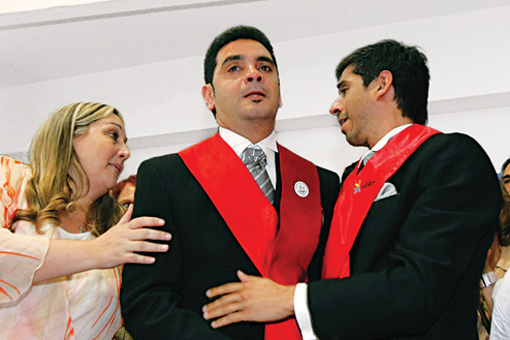María Rachid never wanted to become a politician. But she is responsible for some of the most important human rights bills in Argentina’s recent history, including the 2010 Marriage Equality Law, which legalized same-sex marriage, and the 2012 Gender Identity Law, which allows transgender people to change gender identity on official documents without prior approval.
The 38-year-old has served in the Buenos Aires city legislature since 2011 for the governing Frente Para La Victoria (Front for Victory) coalition. A former vice president of Argentina’s Instituto Nacional contra la Discriminación, la Xenofobia y el Racismo (National Institute Against Discrimination, Xenophobia and Racism—INADI), Rachid is a long time social activist who didn’t always see party politics as the best way to accomplish change. “I never thought I would become a legislator,” she says, though she adds that she was always interested in politics “as a tool to construct a more just society.”
Born and raised in Buenos Aires province, Rachid came out as a lesbian as an adult—around the same time that she came of age as a political activist, having left her law studies at the University of Belgrano to focus on a new career as an activist for women’s rights and sexual liberation.
In the mid-1990s, Rachid says, Argentine party politics seemed to defend the interests only of the wealthy and powerful: “Many of us activists took refuge in social movements because we believed that only from there could we transform rights.”
In 1998, hoping to counteract discrimination against lesbians and bisexual women, Rachid founded the community organization La Fulana (in Spanish, Fulana is an anonymous everywoman), where she organized workshops on building self-esteem, promoting women’s health and fighting violence against women.
By the early 2000s, Rachid was also honing her skills as a journalist and editor for Gay.com, Revista Fulanas and Periódico Queer. She also helped organize Buenos Aires’ annual Gay Pride parades from 1996 to 2009, and in 2010 cofounded the Mesa Nacional por la Igualdad y Contra la Discriminación, a consortium of minority rights organizations.
But it was as founder and president of the Federación Argentina de Lesbianas, Gays, Bisexuales y Trans (Argentine LGBT Federation—FALGBT) that Rachid made a name for herself. Between 2006 and 2010, she organized the “Los mismos derechos con los mismos nombres” (Same Rights, Same Names) campaign that led to Argentina’s historic Marriage Equality Law, making it only the tenth country in the world to legalize same-sex marriage. Nevertheless, for Rachid, the law still represents only a starting point for LGBT rights. “Just as in the case of women,” she says, “We’ve achieved judicial parity, but we haven’t achieved social equality.”
As she approaches the end of her legislative term in 2015, Rachid is gearing up for what may be her hardest campaign: enshrining the right to legal abortion for all. She’s confident that it’s within reach, noting that Argentina’s achievements in passing laws criminalizing violence against women, trafficking of persons, femicide— as well as a law prohibiting antigay “therapies”—have already demonstrated Argentina’s willingness to rethink traditional social norms. “Since 2004,” she says, “we’re practically a different country.” If that’s true, the credit belongs in no small part to Rachid.



